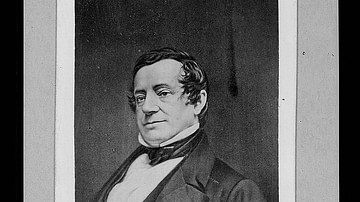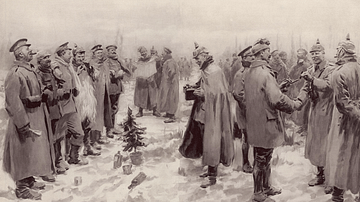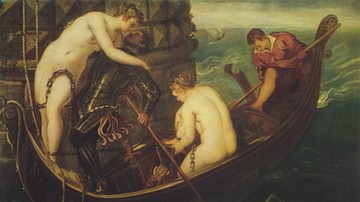Search Definitions
Browse Content (p. 21)

Definition
Washington Irving
Washington Irving (1783-1859) was an American author, essayist, and diplomat best known for his short stories The Legend of Sleepy Hollow and Rip Van Winkle. He was the first professional American author and also the first to achieve an international...

Definition
The Christmas Truce - When the Fighting Paused in World War I
The Christmas Truce of 1914 occurred on the Western Front during the First World War (1914-18). On Christmas Eve soldiers in the trenches spontaneously agreed to a ceasefire. Beginning with the singing of Christmas carols, the unofficial...

Definition
Anglo-Saxon Warfare
Anglo-Saxon warfare was characterised by frequent and violent conflicts between petty kings, which ultimately led to the rise of larger kingdoms such as the Kingdom of Mercia, the Kingdom of Northumbria, and the Kingdom of Wessex. In early...

Definition
Adolf Hitler
Adolf Hitler (1889-1945) was the dictator of Nazi Germany from 1933. He gained power by making popular promises like improving Germany's economy and status in Europe, but when he took these policies too far, he was responsible more than anything...

Definition
Blitzkrieg - The Lightning War Tactic of Combined Arms
Blitzkrieg ('lightning war') is a military tactic combining air and land forces deployed at speed against the enemy's weaker points while the rear lines are simultaneously disrupted by acts of sabotage and bombing. Speed, concentration, and...

Definition
Arapaho
The Arapaho are a North American Native nation originally from the Red River Valley in modern-day Manitoba, Canada, and Minnesota, USA. They migrated south in the early 18th century and established themselves in modern-day Colorado, Montana...

Definition
Nazi-Soviet Pact
The Nazi-Soviet Pact, also called the Molotov-Ribbentrop Pact after the respective foreign ministers of the USSR and Germany, was a non-aggression agreement signed in August 1939. The pact allowed the leader of Nazi Germany Adolf Hitler (1889-1945...

Definition
Arsinoë IV
Arsinoë IV (d. 41 BCE) was a Ptolemaic princess who rebelled against her sister Cleopatra VII during the Alexandrian War in 48 BCE. After being defeated by Cleopatra's ally Julius Caesar, she was a captive in his Roman triumph. Arsinoë later...

Definition
Chesapeake-Leopard Affair
The Chesapeake-Leopard affair was an incident that took place off the coast of Norfolk, Virginia, on 22 June 1807 when the British warship HMS Leopard fired on and boarded an American frigate USS Chesapeake while searching for deserters from...

Definition
Aelfgifu of Northampton
Aelfgifu of Northampton (fl. 1013-1037) was an English noble who married the English and Danish king Cnut (r. 1016-1035) and was the mother of the English king Harold I Harefoot (r. 1035-1040). Aelfgifu reached the height of her influence...